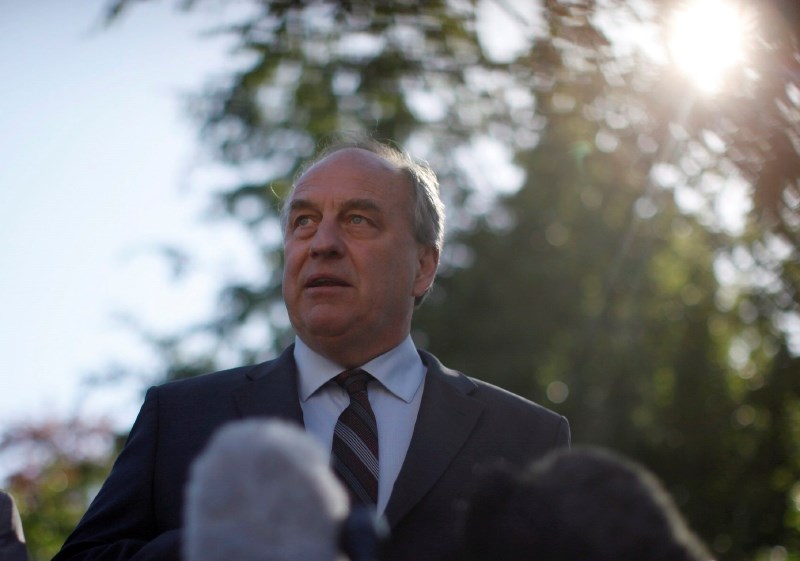B.C.’s NDP government has struck a deal with its power-sharing partners, the B.C. Greens, to tweak the new housing speculation tax and assure its passage into law.
Finance Minister Carole James and Green Party Leader Andrew Weaver announced the deal at the legislature on Thursday, ending any possibility the Greens and Opposition Liberals could join forces to change or defeat the speculation tax, which is to be imposed on vacant homes.
Weaver had demanded the government agree to allow communities to opt out of the tax, which was the position of mayors at the Union of B.C. Municipalities meeting in September.
But on Thursday, he dropped that requirement and instead announced mayors could meet with James every year to express their concerns.
“The Green caucus wanted to allow municipalities to opt out, but that wasn’t acceptable in my opinion,” James said. “So we’ve come to a compromise, where mayors will have the opportunity to bring forward the impacts on their communities directly once a year in a formal meeting.”
The NDP will support three Green amendments to the legislation, which was introduced Tuesday. The first will set mandatory annual meetings with mayors.
The second will require the provincial government to spend any money it collects on the speculation tax on affordable housing in that community.
And the third change will lower the tax rate from one per cent of assessed value to 0.5 per cent for Canadians who live outside of B.C. and have a second home they leave vacant.
The remaining tax rate will be 0.5 per cent of assessed value for B.C. residents and 2.0 per cent for foreign residents.
The speculation tax will apply to those who own multiple properties in Metro Vancouver, municipalities within the Capital Regional District, Kelowna, West Kelowna, Nanaimo-Lantzville, Abbotsford, Chilliwack and Mission.
Owners are exempt if they rent their properties out for at least six months a year. There is a tax credit for B.C. residents with second homes valued under $400,000.
Weaver said the legislation already contains exemptions for developers who are building new housing, as well as exemptions for people suffering medical conditions, disabilities, divorces and other emergencies.
“The bill is not how I would have approached this issue,” Weaver said.
“But with the amendments I’m bringing forward and the work that’s been done by government to limit the impacts of the tax on Canadians who are not speculating, I feel I can support this legislation.”
James said the changes could chop $30 million from the projected $200-million annual revenue from the speculation tax.
Opposition Liberal Leader Andrew Wilkinson scoffed at the deal, saying the Greens achieved virtually nothing and the negotiations were a “farce.”
“At the end of the day, nobody is happy and this is no way to run a government. It certainly shows that at the end of the day, their supposed collaboration is a bit of a failure.”
Langford Mayor Stew Young slammed the deal, saying three changes “mean nothing.”
He predicted the speculation tax, on top of other taxes, will mean the economy will “tank” in a year. “It’ll be on their backs, not mine.”
As for the annual meeting between the province and mayors, Young said: “They aren’t listening anyway. I already told them. So why would they listen in a year?”
Langford’s economy is already slowing because of the speculation tax — housing sales and construction have dropped and that means fewer jobs, he said.
Longtime Alberta developers who have built affordable housing over many years in Langford, spending about $150 million, have told him, “We don’t feel welcome here anymore.”
The promise to plow proceeds back into the area where the tax came from is unclear, Young said, noting that it is not known whether it would return to a specific municipality or to a larger region.
Oak Bay Mayor Nils Jensen had a favourable reaction, saying the amendments are “very supportable.”
He welcomed the annual meeting and the plan to invest taxes into the community where they came from.
“This is a positive step.”
Nanaimo Mayor Bill McKay is unimpressed.
“What changes? I’m saying that facetiously,” he said.
“The fact is this notion that they are going to consult with us — well, we tried to consult with them and they haven’t listened to a thing we’ve said.
“So I don’t know why, if they haven’t listened to any of the input we provided to date, why it is going to make any difference to have a once a year meeting when nothing happens.”
Casey Edge, executive director of the Victoria Residential Builders Association, criticized the promise to invest tax money back into communities where it came from, saying the province already collects more than $2 billion annually in property transfer tax.
That should be more than enough to support affordable housing in B.C. communities, he said.



